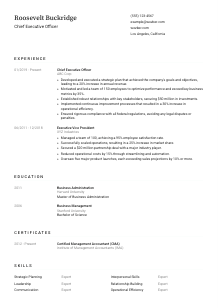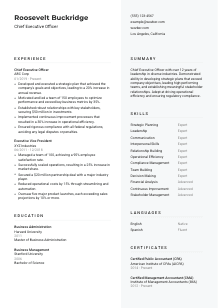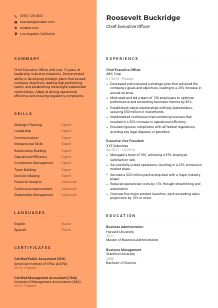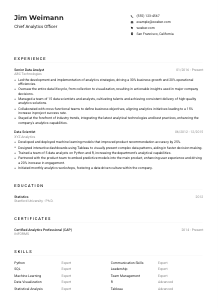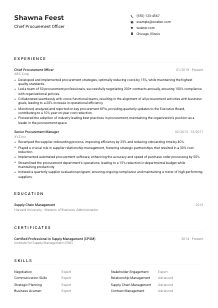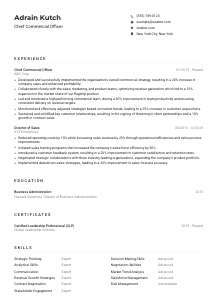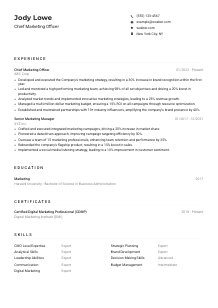Chief Executive Officer Resume Example
Steering companies, but feel your resume is navigating in circles? Sail into this Chief Executive Officer resume example, charted with Wozber free resume builder. See how seamlessly you can anchor your leadership feats to align with executive expectations, ensuring your CEO journey always sets sail to the C-suite shores!
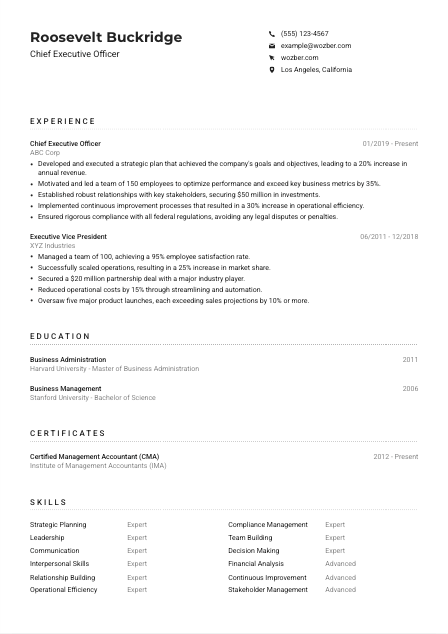
How to write a Chief Executive Officer resume?
Embarking on the journey to land your dream Chief Executive Officer role? Your resume isn't just a piece of paper; it's a testament to your strategic vision, leadership prowess, and operational excellence. Crafting a CEO resume that stands out requires more than just listing your experiences; it's about showcasing your journey as a leader who can steer the company towards unprecedented growth.
Dive into this guide, powered by Wozber's free resume builder and its dedicated tools, including ATS-friendly resume templates and ATS resume scanner for keywords optimization. Let's sculpt your professional narrative into a compelling resume that's not just an ATS-compliant document but a key to unlocking executive doors.
Personal Details
Your personal details are the beacon on your resume, guiding recruiters to your leadership treasure. Let's fine-tune this section for your Chief Executive Officer application, making it not just accurate but strategically aligned with your executive aspirations.
1. Your Name Is Your Legacy
Your name is more than a label; it's the first glimpse into your executive brand. Ensure it stands proudly at the top, with a clean, professional font that commands respect. Think of it as the masthead of your leadership journey.
2. Job Title Speaks Volumes
Position your target job title, "Chief Executive Officer," just below your name. It's a strategic move that instantly aligns your identity with the role, signaling to ATS and hiring managers alike that you're in command of your career trajectory.
3. The Golden Trio: Email, Phone, Location
Include a professional email and your most reliable contact number, ensuring you're easily reachable. Your location, especially when it matches the job's geographical requirement, reinforces your availability. Remember, for a CEO role, accessibility can make all the difference.
4. A Digital Footprint Worth Following
In today's digital age, a LinkedIn profile or personal website can showcase your professional journey and achievements beyond the resume. Ensure they are current and mirror the professionalism of your resume, offering a deeper insight into your executive narrative.
5. Keep It Strictly Professional
Eschew personal details that don't serve your professional narrative, such as age or marital status. Your resume is your executive pitch, distilled into a document that speaks volumes through its focus on your career and vision.
Takeaway
Equipped with a polished Personal Details section, consider it your first triumph in the journey to the executive suite. It's not just about opening doors; it's about ensuring they remain wide open, welcoming your leadership prowess. Lead with precision, keeping your details sharp and aligned with your Chief Executive Officer aspirations.





Experience
The heart of your CEO resume lies in the Experience section. It's here where your leadership voyage comes to life, showcasing strategic decisions, growth milestones, and the profound impact you've had. Let's carve out your path, ensuring every role and achievement resonates with the essence of executive leadership.
- Developed and executed a strategic plan that achieved the company's goals and objectives, leading to a 20% increase in annual revenue.
- Motivated and led a team of 150 employees to optimize performance and exceed key business metrics by 35%.
- Established robust relationships with key stakeholders, securing $50 million in investments.
- Implemented continuous improvement processes that resulted in a 30% increase in operational efficiency.
- Ensured rigorous compliance with all federal regulations, avoiding any legal disputes or penalties.
- Managed a team of 100, achieving a 95% employee satisfaction rate.
- Successfully scaled operations, resulting in a 25% increase in market share.
- Secured a $20 million partnership deal with a major industry player.
- Reduced operational costs by 15% through streamlining and automation.
- Oversaw five major product launches, each exceeding sales projections by 10% or more.
1. Align with Executive Mandates
Start by dissecting the job description, pinpointing phrases like 'scaling organizations' and 'producing positive financial outcomes.' These aren't just requirements; they're the chapters of your leadership story waiting to be told with precision and pride.
2. The Pillars of Your Leadership
Chronology matters, but so does relevance. Kick off with your most recent executive roles, detailing the scope of your leadership, from the size of teams you've inspired to the revenues you've generated. Each role is a testament to your strategic acumen and operational excellence.
3. A Symphony of Achievements
Your accomplishments shouldn't just be listed; they should sing. Use powerful action verbs to lead each bullet point, painting a vivid picture of your leadership narrative. From 'spearheaded strategic initiatives' to 'amplified market presence,' let each word resonate with authority.
4. Numbers Are Your Narrators
Quantifying your achievements provides clarity and impact. Whether it's a 20% growth in annual revenue or a $50 million investment secured, these numbers narrate the scale of your success, making your contributions tangible and memorable.
5. Relevance Reigns Supreme
While versatility is a virtue, relevance is your resume's royal decree. Focus on experiences that mirror the job requirements, ensuring that your paths walked align with the paths ahead. It's not about the number of accolades but the alignment of your actions with the executive ethos.
Takeaway
With a strategically sculpted Experience section, your resume now speaks the language of leadership, resonating with the narrative of growth, strategy, and innovation. Remember, every role you list is a chapter in your executive epic, a testament to your potential to lead and transform. Navigate with confidence, knowing your experience charts a course towards the C-suite.
Education
While your leadership is defined by actions, your education provides the intellectual framework supporting those decisions. For a Chief Executive Officer role, it's about showcasing the strategic and analytical underpinnings of your executive capability. Let's highlight your educational pedigree with precision.
1. Highlight Executive Education
An MBA or related Master's degree isn't just a requirement; it's a signal of your commitment to learning and excellence in business leadership. List these degrees prominently, reflecting not just achievement but alignment with the strategic depth of a CEO role.
2. Present with Clarity and Prestige
Your education should be laid out clearly, with degrees, fields of study, and institutions named with pride. Whether it's a Bachelor's in Business Management from Stanford or an MBA from Harvard, each credential contributes to your executive narrative.
3. Match and Mirror Job Expectations
Tailor your education section to reflect the job's requirements, ensuring your degrees align precisely. For example, showcasing a Master's in Business Administration signifies not just academic excellence but strategic mindset—a cornerstone of CEO success.
4. Relevant Courses and Honors
While your major degrees speak volumes, don't shy away from highlighting specific courses or honors that showcase your focus and dedication. Leadership seminars, strategic management courses, or distinctions like summa cum laude can add depth to your profile.
5. Continuous Learning is Key
The journey doesn't end with formal education. Mention any ongoing learning initiatives, executive courses, or seminars you're partaking in, highlighting a mindset geared towards continuous improvement and adaptability—a critical trait for any successful CEO.
Takeaway
With an education section that reflects not just your qualifications but your strategic and analytical prowess, you're demonstrating to potential employers that your foundation is rock solid. Your educational background tells a story of dedication, continuous learning, and a preparation for leadership that goes beyond textbooks. Let it be a testament to your readiness to take on the executive mantle.
Certificates
In the sea of leadership, certifications are your badges of honor, signals of your expertise and dedication to mastery in specific areas. For a Chief Executive Officer, certifications can augment your profile, adding layers to your leadership narrative with validated expertise.
1. Identify Distinguished Credentials
Certifications like the Certified Management Accountant (CMA) or Certified Public Accountant (CPA) are not mere accolades; they are signifiers of your proficiency and dedication to financial and operational excellence, directly speaking to the core competencies of a CEO.
2. Select Certifications That Amplify Impact
Choose to list certifications that not just fulfill but elevate the requirements of the CEO role. Each certification should be a building block, adding to your narrative of a leader proficient not just in strategy and leadership but in specialized knowledge critical to corporate governance.
3. Validity and Recency Matter
Ensure the certifications you list are current, providing the date of certification. This isn't just a formality; it's a testament to your commitment to staying abreast of best practices and frameworks, essential in the ever-evolving executive landscape.
4. Pursuit of Excellence is Ongoing
Highlight any recent or ongoing certification pursuits to showcase a relentless drive for excellence. In the realm of executive leadership, the learning never stops. Your certifications should reflect a journey of continuous growth, indicative of a leader always striving for the zenith.
Takeaway
By meticulously selecting and presenting your certifications, you underscore not just your expertise but your unwavering commitment to excellence. Certifications are more than just achievements; they are reflections of your dedication to mastering the nuances of leadership and strategic acumen. Let them be the stars that guide you closer to your executive aspirations.
Skills
Your skills section is the compass pointing towards your suitability for the Chief Executive Officer role. It's a concentrated display of your strategic, leadership, and operational capabilities, each skill a beacon signaling your readiness for top-tier executive challenges. Let's curate this section with the precision of a seasoned leader.
1. Distill the Essence
Parse the job description for skills directly tied to flagship CEO responsibilities such as 'strategic planning,' 'team building,' and 'stakeholder management.' These aren't just skills; they're the essence of your executive identity, the core of your leadership DNA.
2. Fuse Hard and Soft Skills
Blend your strategic vision and operational prowess (hard skills) with your interpersonal eloquence and decision-making savvy (soft skills). This mix demonstrates a holistic leadership repertoire, capable of steering the corporate ship through calm and stormy waters alike.
3. Precision over Proliferation
Resist the urge to list every skill under the sun. Instead, cherry-pick those that align with the CEO role's demands. This focused approach ensures that your resume speaks directly to the needs of the organization, showcasing you as the tailor-made fit for the mantle.
Takeaway
With a meticulously crafted Skills section, your resume now shines a spotlight on your unique leadership and strategic capabilities, setting you apart in the crowded executive landscape. Let each skill listed be a testament to your readiness to lead, each a step closer to the CEO role you're destined for. Remember, in the symphony of leadership, every note matters. Play yours with precision.
Languages
In today's interconnected business world, linguistic ability is more than just a skill—it's an asset that enhances your leadership palette, offering nuanced perspectives and fostering global connections. As a Chief Executive Officer, let's ensure your linguistic prowess showcases not just your ability to communicate but to connect across borders.
1. Prime Position for English
Given the job description's emphasis on English, position it at the forefront, showcasing your adeptness in the corporate lingua franca. This isn't just about fluency; it's about demonstrating your capability to lead and communicate effectively on a global stage.
2. Showcase Additional Languages
While the focus is on English, additional languages signal your ability to navigate multilingual environments, a prized trait in a global executive landscape. List these languages, demonstrating a breadth of communication that transcends borders.
3. Honesty in Proficiency
Clearly state your level of proficiency in each language. From 'native' to 'basic,' these levels paint a realistic picture of your linguistic capabilities, ensuring expectations are met with authentic experiences in multicultural interactions.
4. Tailor to Your Executive Scope
Consider the geographic scope and stakeholder landscape of your target role. For a CEO charged with leading global operations or engaging diverse teams, being multilingual isn't just an asset; it's an imperative, underscoring your global mindset and cultural adaptability.
5. Language as a Leadership Tool
View each language you speak not just as a method of communication but as a conduit for leadership, understanding, and connection. In the global market, your ability to converse in multiple languages equips you with the tools to lead more inclusively, empathetically, and effectively.
Takeaway
Your linguistic skills on the resume serve as bridges, connecting you to myriad cultures, perspectives, and people. Embrace this global lexicon, letting it amplify your executive allure, underlining your capability to lead with a world view. As a Chief Executive Officer, your words carry weight; ensure they resonate far and wide, embracing diversity in every dialect.
Summary
The executive summary is your opening salvo, a powerful preamble that encapsulates your career ethos. For a Chief Executive Officer role, it's about distilling the essence of your executive journey, aligning your narrative with the strategic, leadership, and innovation benchmarks of the role. Let's craft a summary that not only introduces but intrigues.
1. Capture Your Executive Essence
Begin with a bold, engaging introduction that paints you as a visionary leader. Use succinct, impactful language to forge an immediate connection, setting the tone for your detailed leadership narrative that unfolds throughout the resume.
2. Strategic Highlights
Pinpoint pivotal achievements that align with the CEO criteria—scaling organizations, financial acumen, and innovation. These highlights aren't mere facts; they're the tales of triumphs that attest to your readiness to helm the executive suite.
3. Conciseness is Key
In a few sharp sentences, deliver a compelling encapsulation of your leadership journey. Aim for brevity, ensuring each word contributes to an image of you as a strategic, transformative leader poised for C-suite challenges.
4. Tailored to Triumph
Ensure your summary mirrors the language and priorities of the job description, forging an immediate resonance with the hiring manager. It's not just about fitting a mold; it's about showcasing your leadership narrative as the solution to their executive search.
Takeaway
With an executive summary that compellingly introduces your leadership saga, you're primed to capture the attention of hiring managers, setting the stage for a deeper exploration of your executive prowess. Consider it the opening chapter of your journey towards the executive apex. Craft it with care, letting it echo your strategic vision and leadership essence, compelling and concise.
Launching Your Chief Executive Officer Journey
Congratulations on fine-tuning your resume into a powerful narrative of leadership and success. Armed with insights from Wozber's free resume builder, including its ATS-friendly resume templates and ATS resume scanner for keyword optimization, you're now poised to project your executive persona with confidence. Remember, your resume is more than a document—it's a declaration of your readiness to lead, to innovate, and to elevate organizations to new heights.
Chart your course with conviction, leveraging your newly crafted resume as your compass towards CEO success. The C-suite awaits; let your journey begin.

- Bachelor's degree in Business, Management, or a related field;
- Master's degree or MBA preferred.
- A minimum of 10 years of executive leadership experience, with a proven track record of successfully scaling organizations.
- Strong financial acumen, with the ability to strategize and produce positive financial outcomes.
- Exceptional interpersonal and communication skills, with the ability to build relationships at all levels of the organization.
- Relevant professional certifications, such as Certified Management Accountant (CMA) or Certified Public Accountant (CPA), are a plus.
- Must be capable of communicating effectively in English.
- Must be located in or willing to relocate to Los Angeles, California.
- Develop and execute strategic plans to achieve the company's goals and objectives.
- Lead and motivate teams to achieve optimal performance and meet key business metrics.
- Establish strong relationships with key stakeholders, including shareholders, board members, and employees.
- Drive continuous improvement and innovation throughout the organization.
- Ensure compliance with all local, state, and federal regulations and guidelines.





